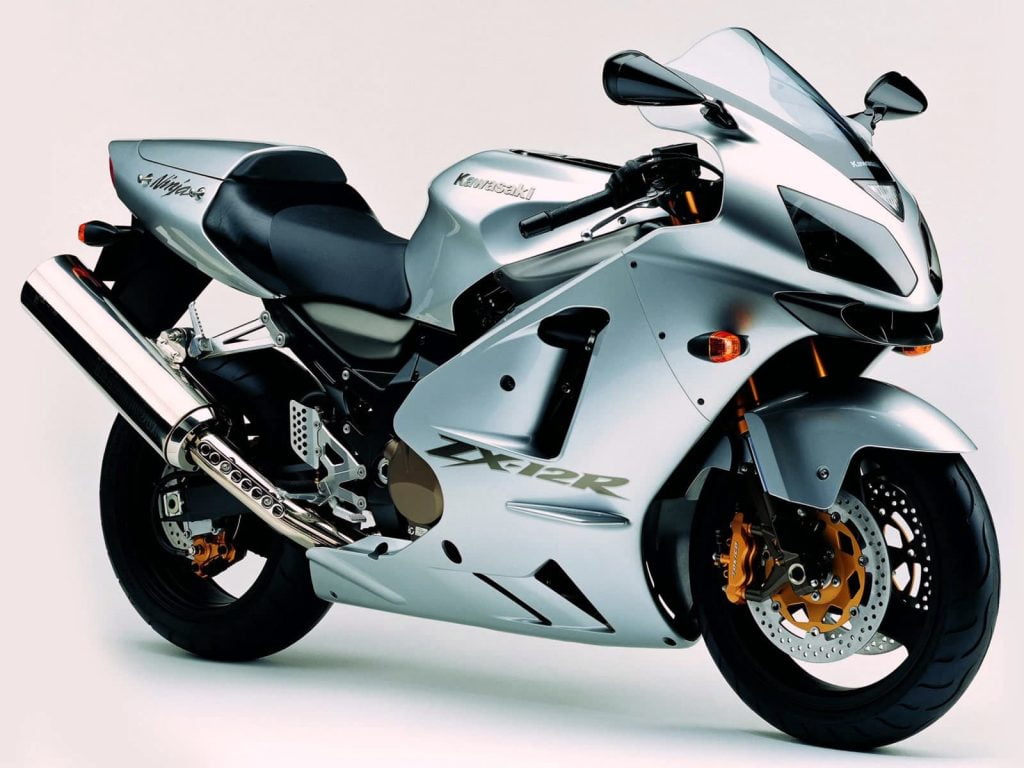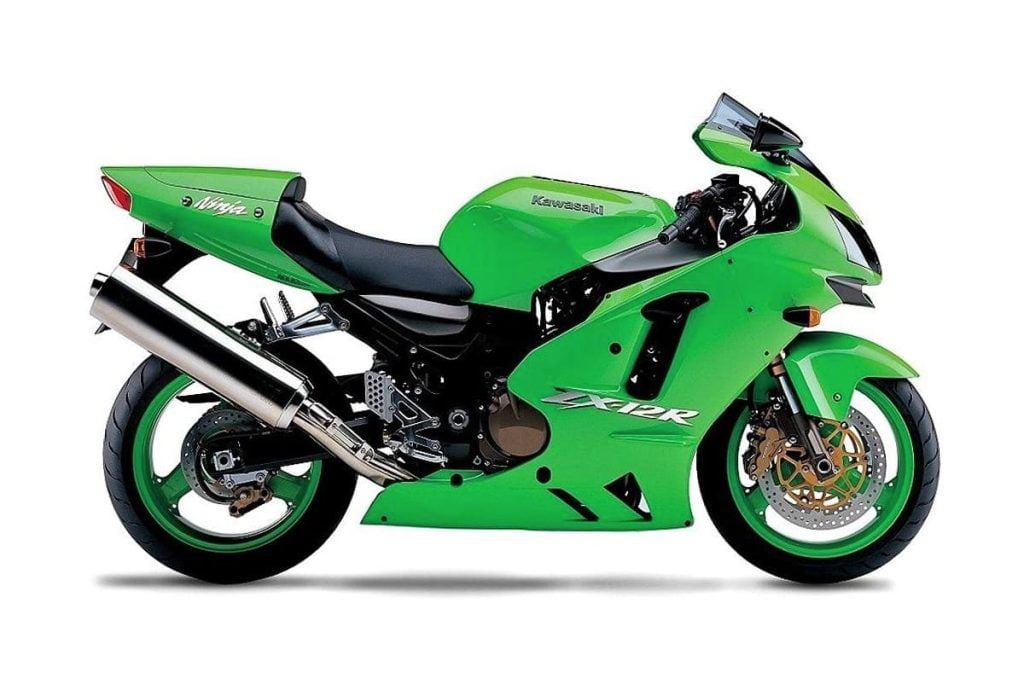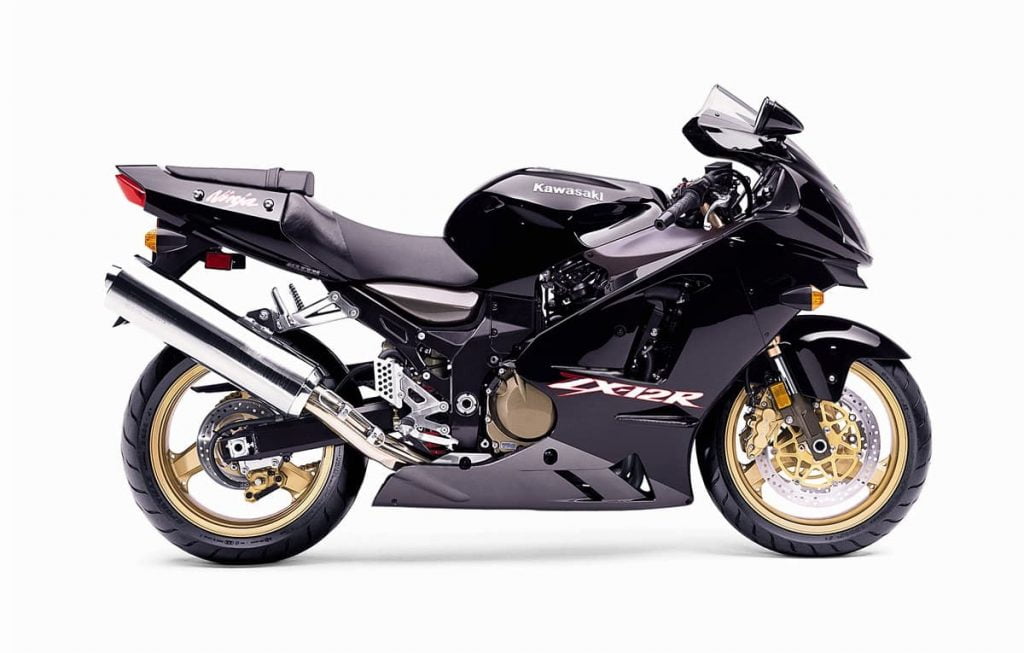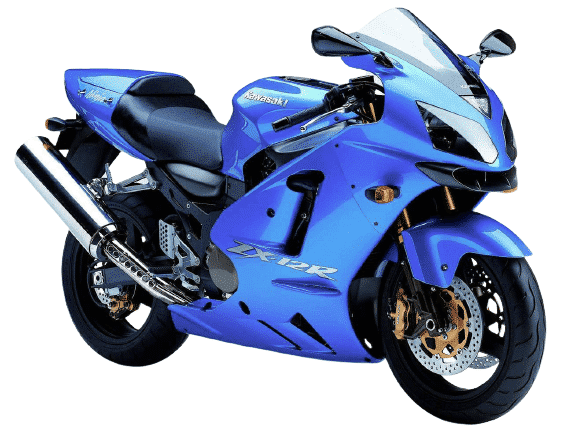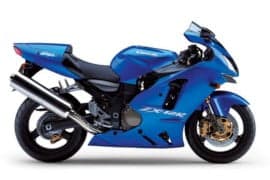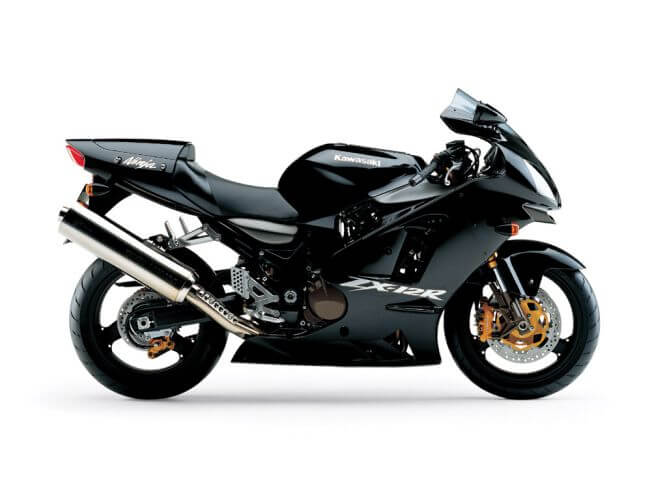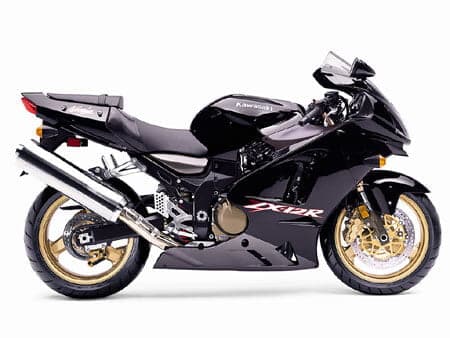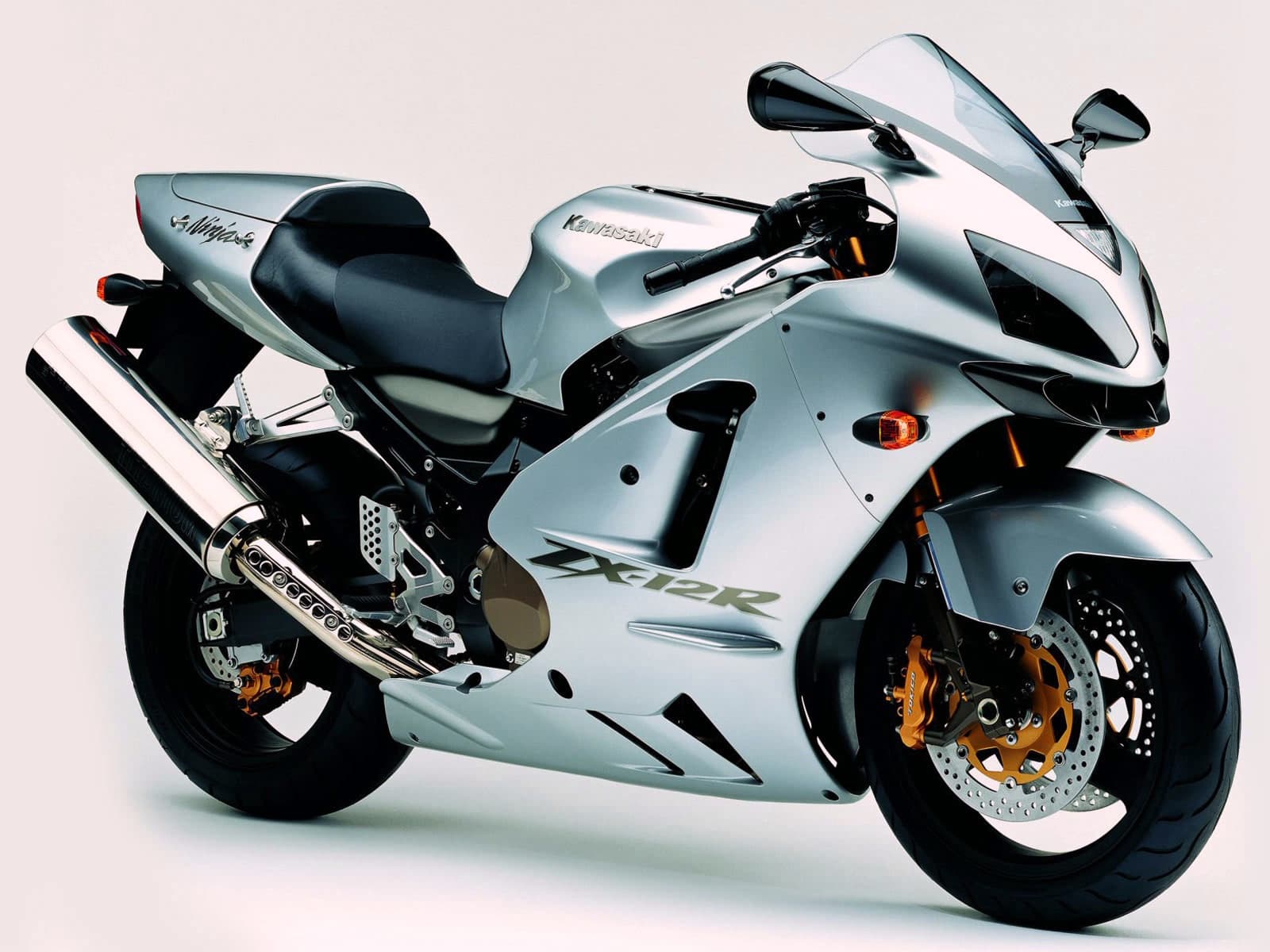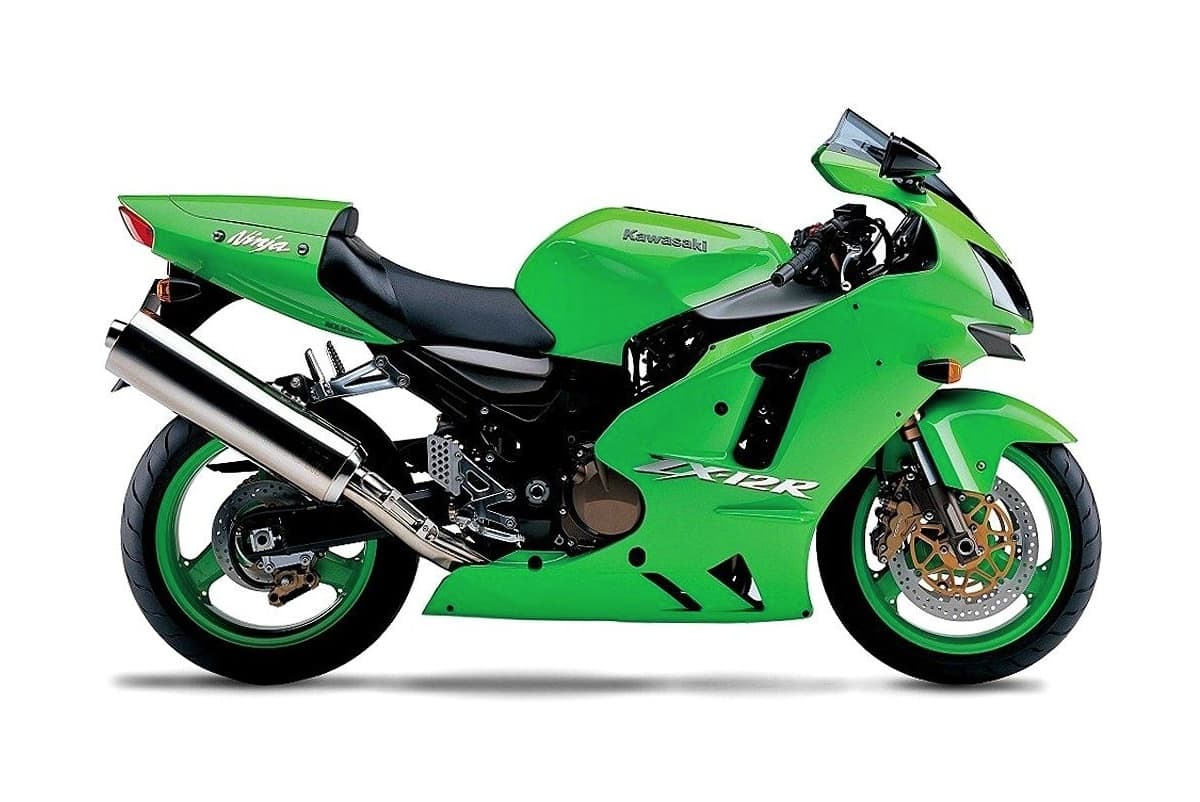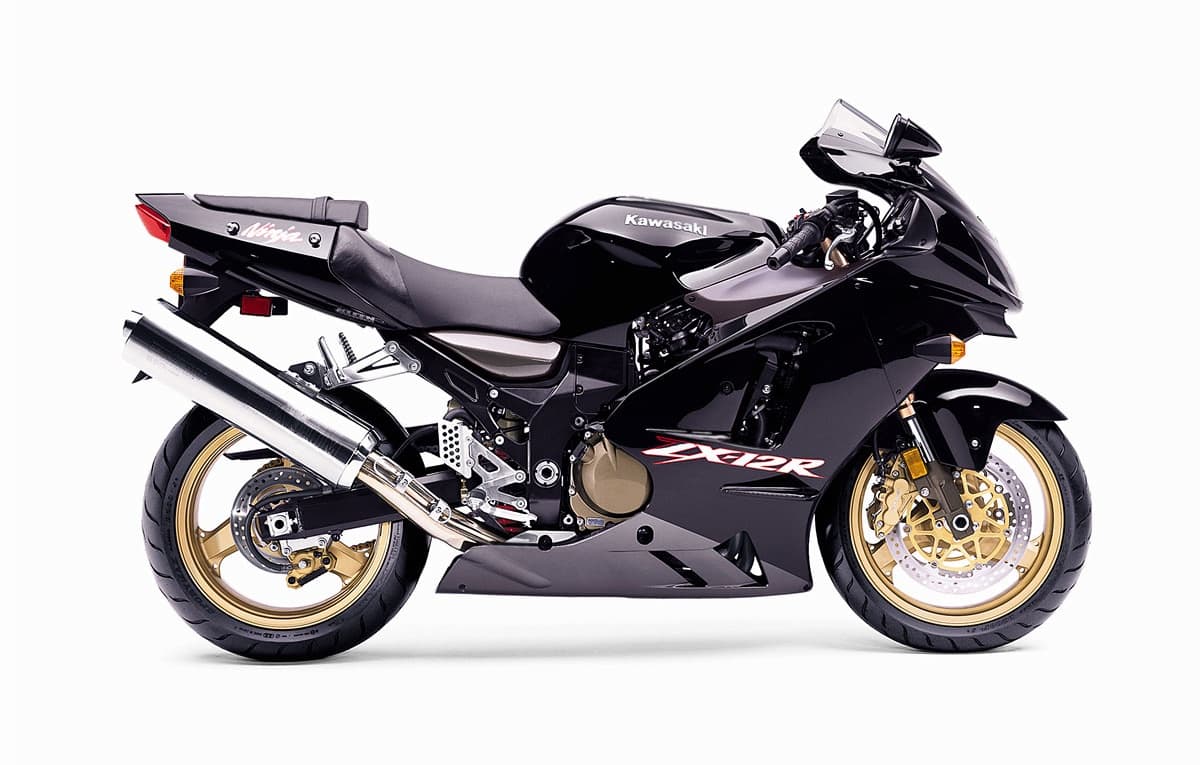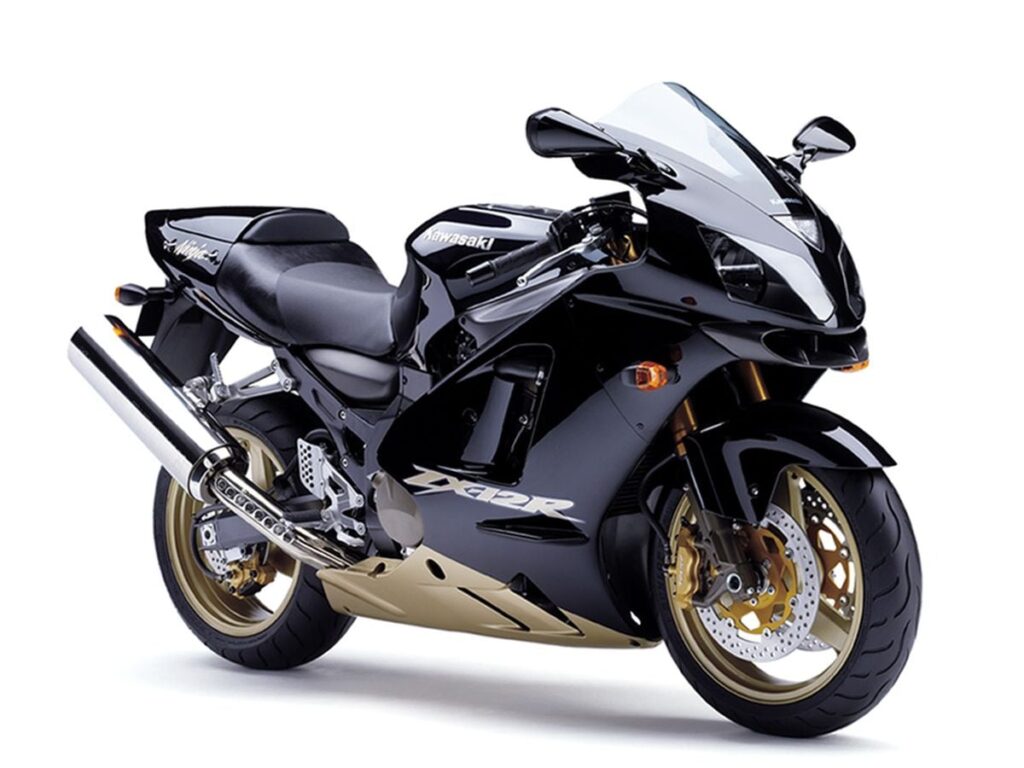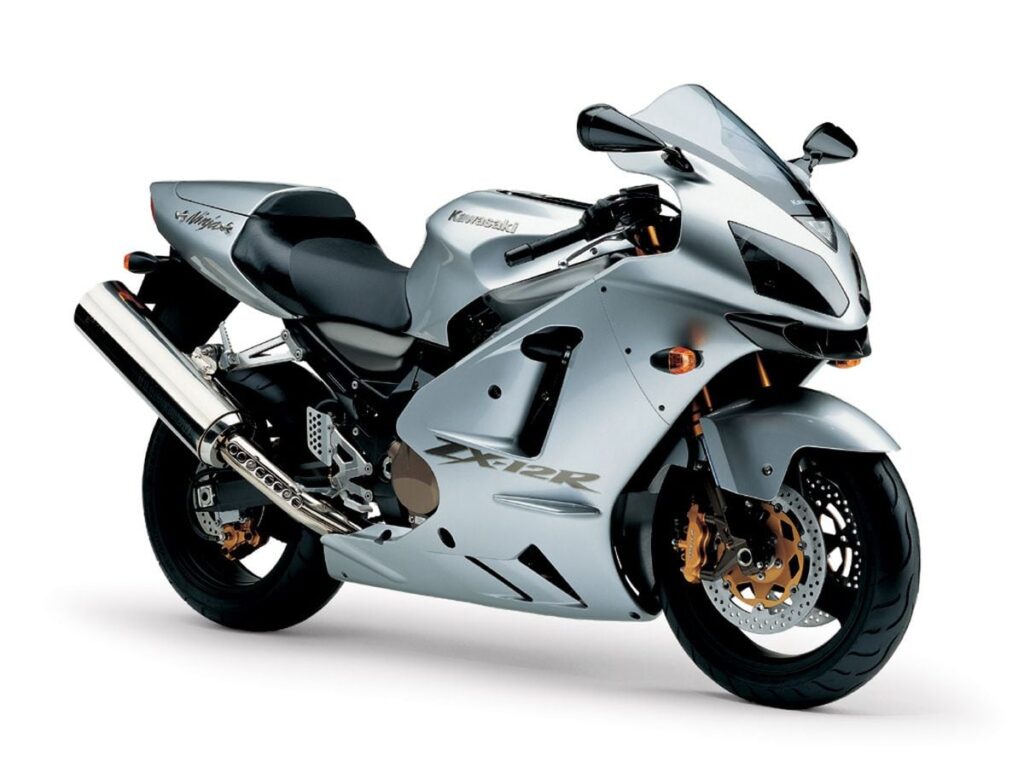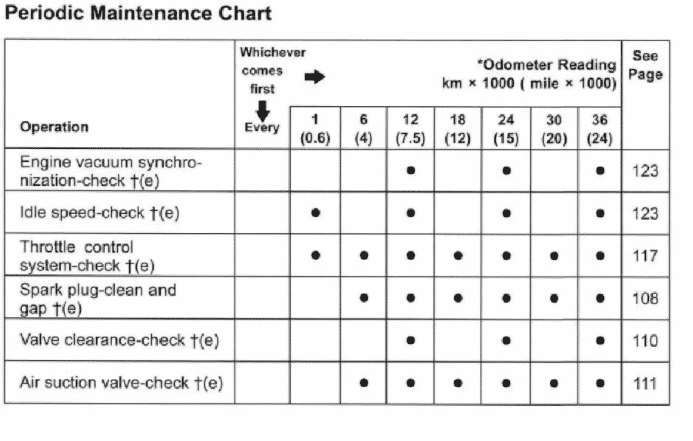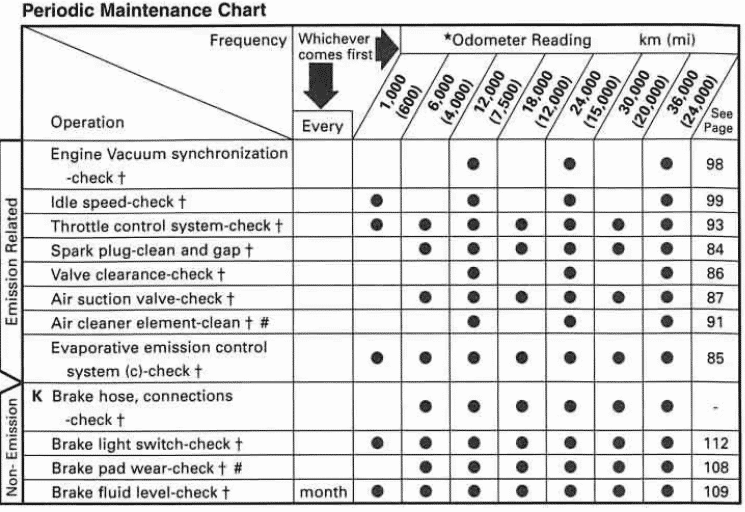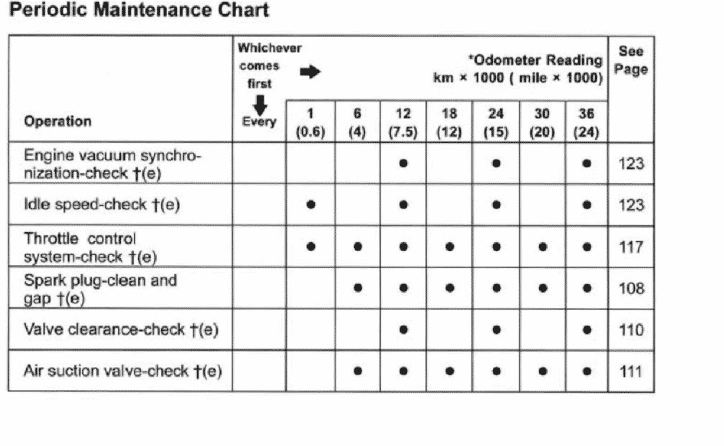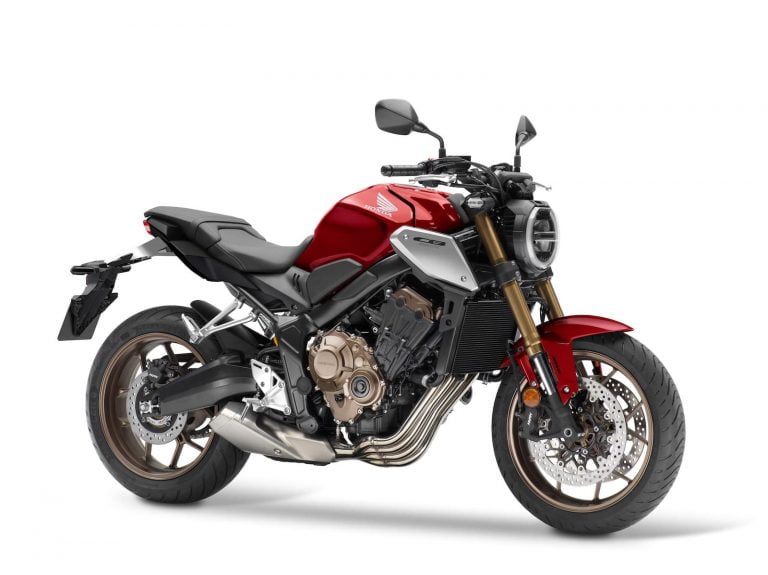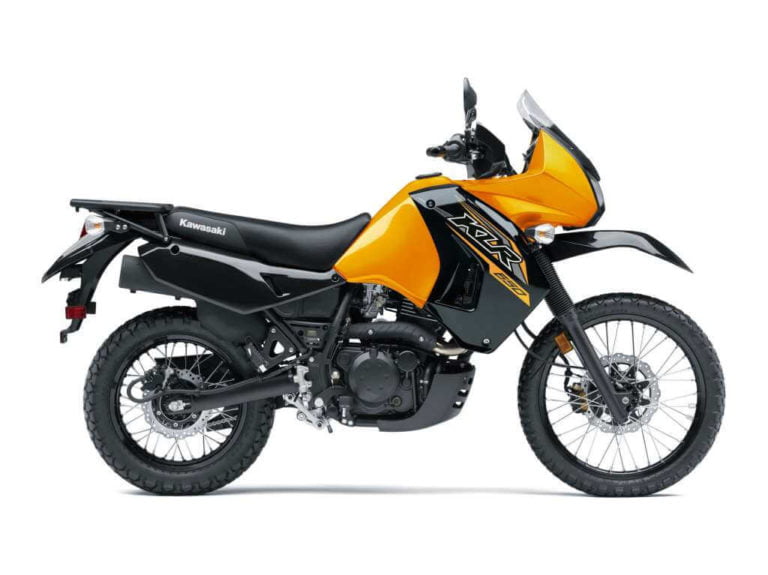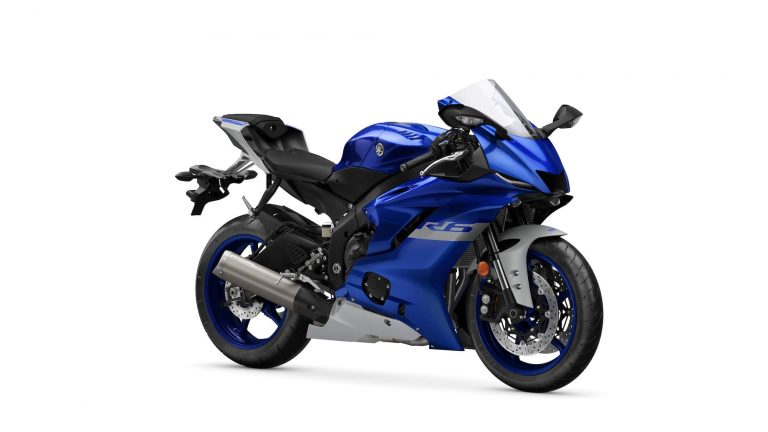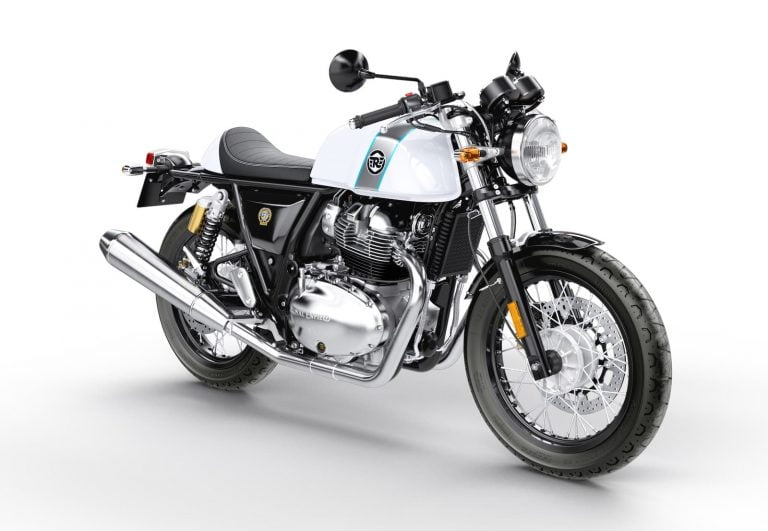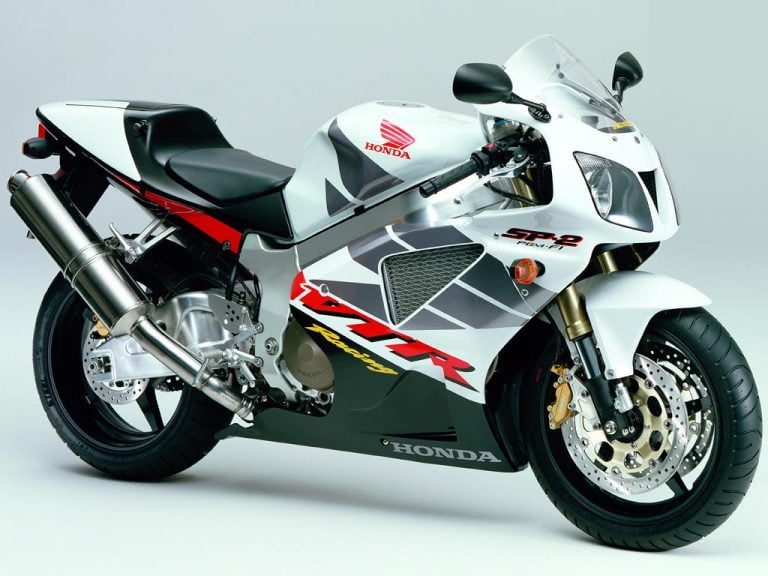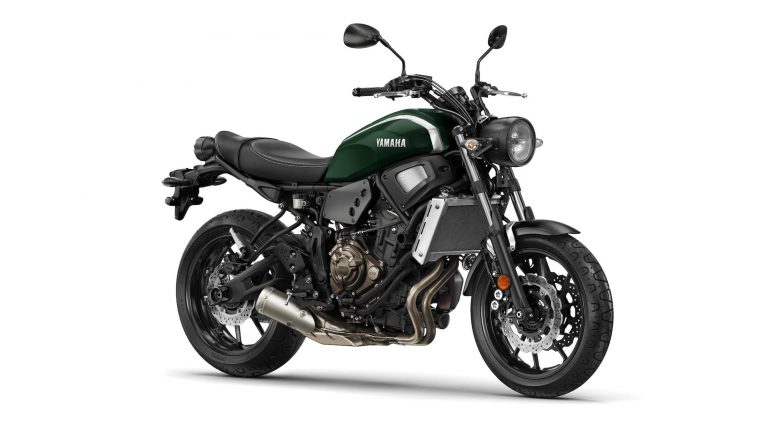Kawasaki Ninja ZX-12R (2000-2006) Simplified Maintenance Schedule and Service Intervals
This is the maintenance schedule with associated service intervals for the Kawasaki Ninja ZX-12R.
The Kawasaki Ninja ZX-12R is a sportbike in the Ninja series made from 2000 through 2005, replacing the ZX-11 or ZZ-R1100.
The ZX-12R is based on an 1198cc liquid-cooled four-valve-per-cylinder inline four-cylinder engine. In its initial form it made a claimed 133 kW / 181 hp at 10 500 rpm at initial release. Final drive is via a six-speed transmission and a chain. Kawasaki made some changes that slightly altered the power delivery in 2002, but it was still the same basic high-speed sport bike.
The ZX-12R was sold alongside the similar but less speed-focussed ZZ-R1200. It was discontinued in 2006 and was replaced by the higher-power and higher-capacity Kawasaki ZX-14.
This site has links for things like oil and spark plugs from which we earn a commission (which unfortunately nobody can save, not even us). If you appreciate this work, then please use those links. Thanks!
Maintenance Schedule for Kawasaki Ninja ZX-12R
Below is the maintenance schedule for the Kawasaki Ninja ZX-12R.
Notes:
- For higher odometer readings, repeat at the frequency interval established below.
- Kawasaki recommends you get critical safety or emissions-related items serviced by a qualified mechanic.
- For items marked “check” or “inspect”, adjust, replace, or torque as necessary.
- Service some items more regularly when operating in harsh (dusty / wet conditions), e.g. air filter, oil, spark plugs.
Service Schedule
Below is the schedule of maintenance items that need regular attention or replacement.
The Kawasaki Ninja ZX-12R has 3500 mile or 6000 km service schedules. At every service, or every 6 months, change the engine oil and do a series of checks.
The valve service interval for the ZX-12R is every 7000 miles or 12000 km. Since the ZX-12R has a four-cylinder engine with four valves per cylinder, you need to check sixteen clearances.
Kawasaki recommends a front fork oil change every two years. This is quite aggressive and most mechanics wouldn’t say it’s necessary that often unless being used extremely frequently.
Finally, keep the coolant and the brake fluid fresh — change them every two years.
| mi x 1000 | 4 | 7.5 | 12 | 15 | 20 | 24 | |
|---|---|---|---|---|---|---|---|
| km x 1000 | 6 | 12 | 18 | 24 | 30 | 36 | Every |
| Perform general inspection checklist (see below) | ✓ | ✓ | ✓ | ✓ | ✓ | ✓ | |
| Engine oil – change (Kawasaki 10W-40 or other similar weight API SE / JASO MA or above) | ✓ | ✓ | ✓ | ✓ | ✓ | ✓ | 6 months |
| Oil filter – replace | ✓ | ✓ | ✓ | ||||
| Spark plug – clean and gap. Replace as necessary (NGK CR9EKPA) | ✓ | ✓ | ✓ | ✓ | ✓ | ✓ | |
| Valve clearances – check | ✓ | ✓ | ✓ | ||||
| Air cleaner element – clean / Replace as necessary (KA-1299-1) | ✓ | ✓ | |||||
| Engine vacuum synchronization – check | ✓ | ✓ | ✓ | ||||
| Idle speed – check Adjust to 950 – 1050 rpm | ✓ | ✓ | ✓ | ||||
| Brake fluid – change (Castrol DOT 4) | ✓ | 2 years | |||||
| Swingarm pivot – lubricate | ✓ | ✓ | ✓ | ||||
| Other general lubrication — perform | ✓ | ✓ | ✓ | ||||
| Coolant – change | ✓ | 2 years | |||||
| Front fork oil – change | ✓ | 2 years | |||||
| Steering stem bearing – lubricate | ✓ | 2 years | |||||
| Brake master cylinder cup and dust seal – replace | 4 years | ||||||
| Caliper piston seal and dust seal – replace | 4 years |
Standard maintenance checklist
Perform this service checklist according to the schedule above.
- Note: The below includes a few items that are trivial in nature (e.g. checking for radiator leaks) that are included in most other motorcycle maintenance schedules, but which weren’t included in this one.
- Note: Not all items are strictly needed every service, but most checks are trivial, as they are mostly checks for leaks
| Kawasaki Ninja ZX-12R standard maintenance checklist |
|---|
| Throttle control system – check (smooth operation and free play) Target free play 2-3 mm / 0.08-0.12 in |
| Air suction valve – check |
| Evaporative emission control system (if fitted) – check |
| Brake hose, connections – check |
| Brake light switch – check |
| Brake pad wear – check |
| Brake fluid level – check Check regularly – e.g. pre-ride, or monthly at a minimum |
| Fuel hoses, connections – check |
| Radiator hoses, connections – check |
| Clutch – check for smooth operation, adjust free play (2-3mm / 0.08-0.12 in) |
| Steering – check smooth operation, notchiness |
| Front fork oil leak – check |
| Rear shock absorber oil leak – check |
| Drive chain wear – check |
| Drive chain roller wear – check |
| Nuts, bolts, and fasteners tightness – check |
| Tire wear – check |
Maintaining Your Chain on the Kawasaki Ninja ZX-12R
It’s important to maintain your chain on the ZX-12R, as on any chain-driven motorcycle. Use a good-quality chain lubricant like Motul chain paste, or a Motul chain care kit which comes with a couple of handy tools to maintain the chain.
Kawasaki recommends you follow the following chain maintenance schedule:
| Chain maintenance item | Every |
|---|---|
| Check drive chain lubrication condition, lubricating if necessary (Motul chain paste) | 400 mi / 600 km |
| Check drive chain slack, adjusting if necessary | 600 mi / 1000 km |
Notes:
- Do these items (checking/adjusting slack, and checking/applying lubrication) more often if you ride your ZX-12R in dusty or rainy conditions.
- Always lubricate the chain after washing the motorcycle.
Tyre size and tyre pressure for the Kawasaki Ninja ZX-12R
The ZX-12R is a sport touring motorcycle, so it works best with sport touring or sport tires. You can fit road tires though as well if you plan a lot of riding in adverse conditions, e.g. rain.
The manual recommends the following tire sizes and pressures.
| Wheel | Tire size | Tire pressure (cold) |
|---|---|---|
| Front | 120/70 ZR17 M/C (58W) | 290 kPa/42 psi |
| Rear | 200/50 ZR17 (75W) | 290 kPa/42 psi |
Yes, the manual recommends even pressures on the front and rear.
The recommended pressure is optimised for tire longevity. If you want to prioritise grip, lower the pressure to suit.
About the Kawasaki Ninja ZX-12R
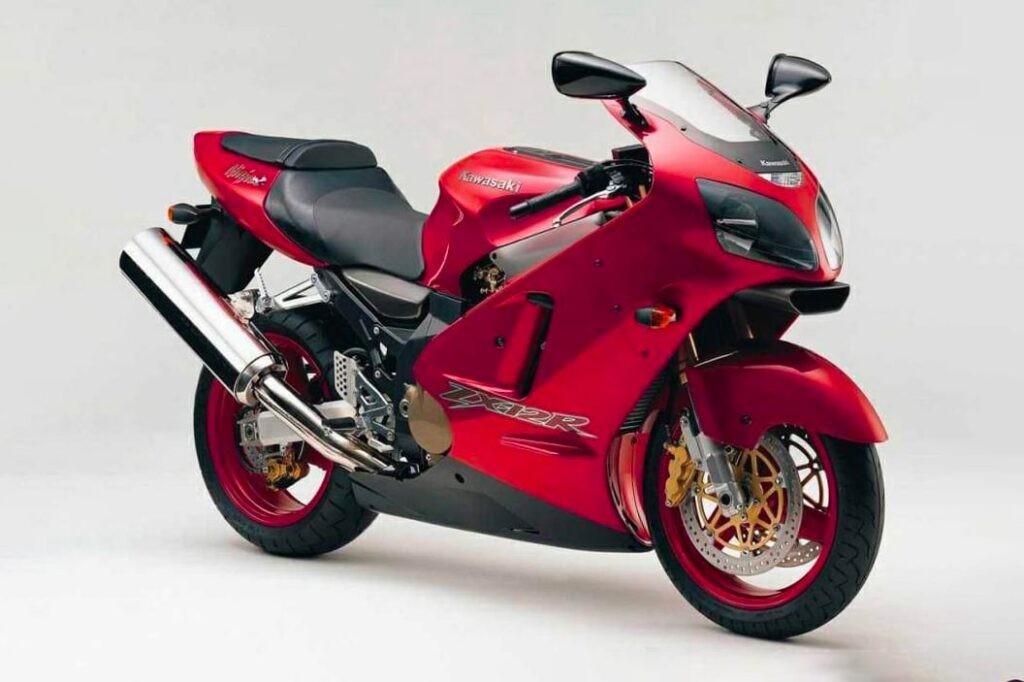
The Kawasaki Ninja ZX-12R is one of Kawasaki’s high-powered sports bikes. Not a track-focused sports bike, nor a touring machine, the ZX-12R is designed to go fast and to be relatively comfortable while doing it.
The ZX-12R is powered by a 1199 cc fuel-injected inline-four engine produces 181 hp (133 kW) at low speed and increases to 190 hp (140 kW) at high speed with the help of its ram-air intake.
Even though initial reviews of the Kawasaki ZX-12R invevitably compared it (unfavourably) to the faster first-generation Suzuki GSX1300R Hayabusa, the Kawasaki ZX-12R is by all means still a lightning-fast and well-handling bike.
The riding position of the Kawasaki ZX-12R is quite aggressive and is a little uncomfortable if you’re thinking “sport tourer”. But if you think of it as a sport bike, like an alternative to the ZX-10R, then it can be considered comfortable — relatively speaking.
One limitation of the Ninja ZX-12R that makes it a little harder to service is the frame structure — it uses a monocoque aluminium frame (like a central backbone) that makes access to some things a little difficult, especially when it comes time to do a valve service.
Over time Kawasaki gradually improved the ZX-12R.
- 2000: The original Ninja ZX-12R with the very obnoxious scoop under the front headlamp.
- 2002: Kawasaki gave it a frontal air scoop that looks like a protruding bottom lip, less conspicuous. Kawasaki gave it a ton of interior changes including a heavier flywheel, a and new fuel map to make low-speed riding easier.
- 2004: Radial brakes and new 43mm forks, as well as some styling updates.
Reference — Manual for the Kawasaki Ninja ZX-12R
The above maintenance schedule comes directly from the user’s manual for the 2000-2005 year models of the Kawasaki Ninja ZX-12R, comparing them, and also consulting parts fiches and service guidelines.
The manuals are available from Kawasaki’s website here.
